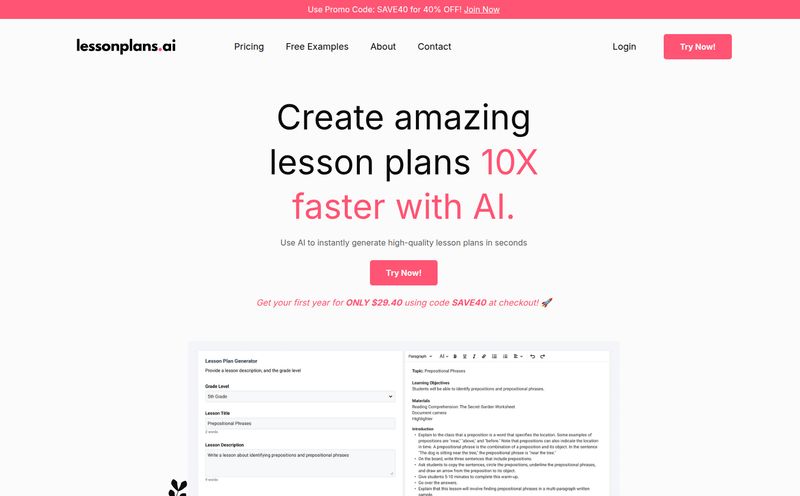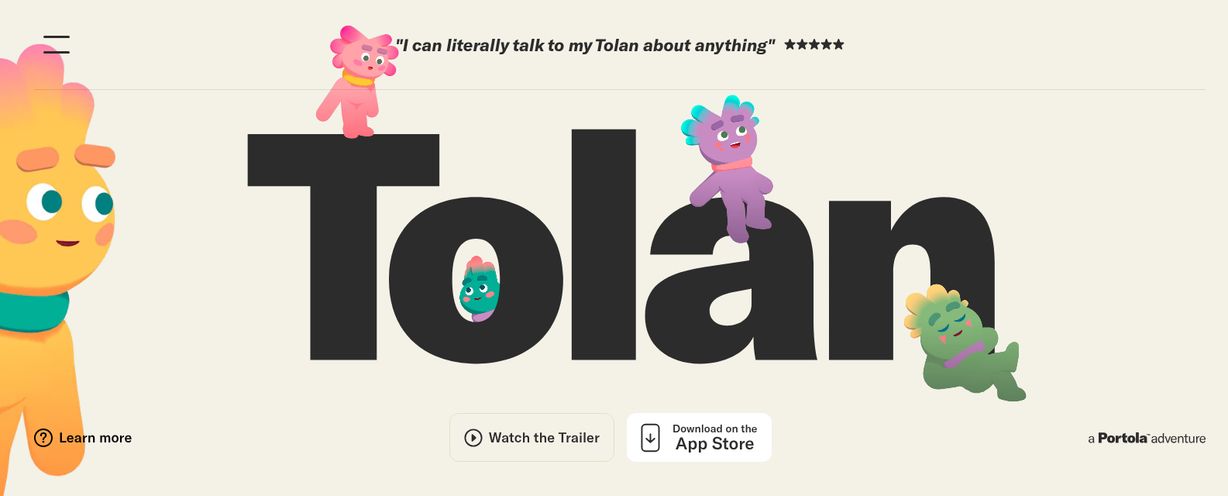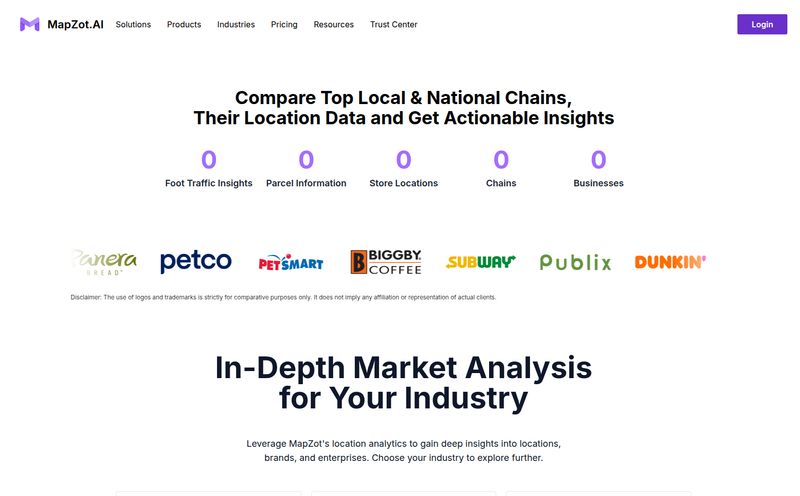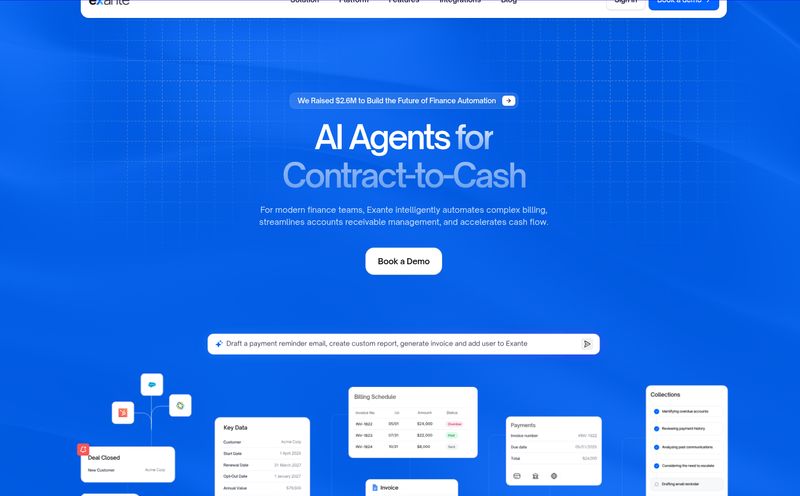Let me tell you a story. It’s 2019. I’m deep in the trenches with a SaaS startup, and we’re about to launch a major feature. We thought we knew what our users wanted. We had feedback coming in from Intercom chats, Zendesk tickets, angry emails to the CEO, and that one super-vocal guy on Twitter. We'd compiled it all into a monstrous spreadsheet that our product manager, bless her heart, tried to make sense of. The result? A launch that landed with a soft, disappointing thud.
We built what we thought they were asking for, but we missed the why. We couldn't see the forest for the trees. We didn’t have a way to connect the dots, to see that 15 small complaints about workflow were actually pointing to one giant, underlying problem. We needed to “make every feature count,” but we were just throwing spaghetti at the wall. Sound familiar? Yeah, I thought so.
It’s a pain I’ve carried with me for years. Which is why, when I first stumbled upon Bagel.ai, my inner, battle-scarred product nerd sat up and paid attention. An AI-native product intelligence platform? Okay, marketing buzzwords. But one that promises to turn scattered feedback into “revenue-driving product moves”? Now you’re speaking my language.
What Exactly is Bagel.ai? (And Why Should You Care?)
Let's cut through the jargon. At its core, Bagel.ai isn't just another dashboard with pretty graphs. I’ve seen enough of those to last a lifetime. Instead, think of it as a translator and a strategist fused into one. It plugs into all those places where customers are talking about you—your support desk, your CRM, Slack channels, sales call transcripts—and instead of just collecting the data, it understands it.
It uses natural language processing (NLP) to pull out the actual intent behind a customer's words. It’s the difference between hearing “I can’t find the export button” and understanding “Our entire team is blocked because we can’t get data out of your system to use in our weekly reports.” One is a UI complaint; the other is a churn risk with a dollar amount attached to it.
Bagel.ai promises to be that missing link. That objective, data-driven voice in the room that says, “Hey, I know the CEO is excited about this shiny new thing, but the data from our top 10 enterprise accounts suggests we should fix this one integration first, and here’s the potential revenue we'll protect.” It’s designed to stop you from building features that flop.
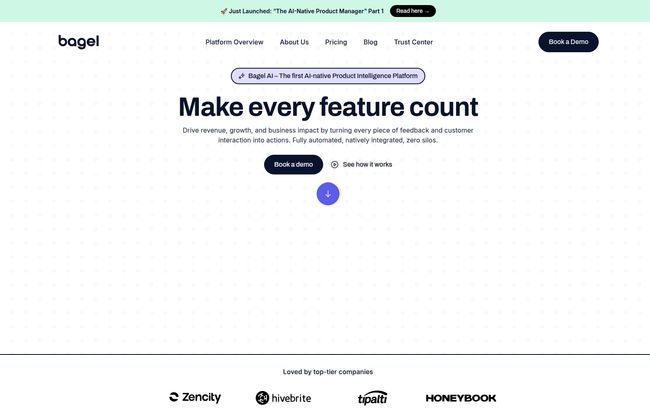
Visit Bagel AI
Sifting Through the Noise: Core Features That Actually Matter
A tool is only as good as its features, right? But more features don't always mean a better tool. It's about having the right ones. From what I’ve seen, Bagel.ai focuses on a few core areas that target the biggest headaches in product management.
Automatic Evidence Consolidation
Remember my horror story about the giant spreadsheet? This feature is the cure for that. Bagel.ai automatically pulls in and centralizes feedback from all your different sources. No more manual copy-pasting. It's about creating a single source of truth for your product’s feedback loop. This sounds simple, but the amount of time and potential for human error it eliminates is just… chef’s kiss. It’s a foundational piece that makes everything else possible.
AI-Generated Roadmap Ideas
This is where things get really interesting. Bagel.ai doesn't just show you what people are saying; it actively suggests what you should build next. It groups related feedback into themes and presents them as potential roadmap initiatives, complete with the consolidated “evidence” to back them up. This shifts the PM's role from being a glorified data entry clerk to a high-level strategist. Instead of spending your days in the weeds of feedback tickets, you’re presented with data-backed opportunities and can focus on prioritizing what will have the biggest impact. It’s a pretty profound change in workflow.
Metrics That Actually Prove ROI
Every product manager has been in that meeting where they have to justify their roadmap. You’re fighting for engineering resources against the sales team who wants a specific feature for one big client. Bagel.ai aims to arm you with the data to win that fight. By connecting product decisions to business outcomes—like closing deals, reducing churn, or increasing expansion revenue—it helps you prove your roadmap's worth. You can walk into that meeting and say, “Building Feature X will address feedback from 30% of our user base, including 5 enterprise accounts at risk of churning, representing $250k in ARR.” That’s a conversation-ender.
Smooth Integrations with Your Existing Stack
Let's be real, nobody has the appetite for a tool that forces you to change your entire workflow. The fact that Bagel.ai is built to integrate with the tools you already use (the site shows logos for giants like Qualtrics, Zendesk, and Hivebrite) is a huge green flag. It’s not trying to replace your CRM or your support platform; it’s trying to make them smarter. This lowers the barrier to adoption significantly. However, this also points to one of the potential hurdles, which I’ll get to in a bit.
The Real-World Impact: Turning Feedback into Gold
When you put these features together, you start to see the bigger picture. This isn't just about organizing feedback; it's about accelerating growth. By streamlining your go-to-market strategy, you can get the right features out the door faster and with more confidence. You're no longer guessing what the market wants; you have a direct line to its collective consciousness.
In my experience, the biggest drag on a product team's velocity is a lack of clarity and alignment. The endless debates, the stakeholder politics, the fear of making the wrong call. A tool like Bagel.ai acts as an objective referee. The data doesn’t have an ego. It doesn’t have a pet project. It just shows you where the opportunity lies. This can transform a company's culture from one that is sales-led or founder-led to one that is truly product-led and customer-centric.
So, What's the Catch? A Look at the Potential Downsides
No tool is perfect, and it’s my job to be a bit of a cynic. Based on the info and my own experience with similar platforms, there are a few things to keep in mind.
First, the reliance on integrations is a double-edged sword. While great for workflow, it means there’s an initial setup and configuration process. This isn’t a magic wand you wave and it instantly works. You’ll need to invest some time upfront to connect your data sources and make sure everything is flowing correctly. This is expected for any serious B2B tool, but it's something to be aware of.
Second, a mention of “complex cookie settings management” in some descriptions I've seen is interesting. My take? This isn't about website cookies. It likely points to the depth of data governance required. When you're consolidating sensitive customer feedback from multiple systems, you need robust controls. The fact that they have SOC 2 Type II compliance tells me they take security seriously, but it also means you’ll need to be thoughtful about your data handling policies. This isn't a con, so much as a sign of its enterprise-readiness.
The Big Question: Bagel.ai Pricing
Alright, let's talk money. If you head to their website looking for a pricing page with neat little boxes and monthly fees, you won't find one. And honestly, that's not surprising.
Bagel.ai is clearly positioned for growth-stage and enterprise companies. The pricing model reflects that. You’re not just buying software; you’re getting a “dedicated AI model” and “setup included.” This is a bespoke solution, not an off-the-shelf product. The price will almost certainly depend on factors like the volume of feedback data you have, the number of integrations you need, and the size of your team. The path forward is to book a demo and get a custom quote. It’s the standard playbook for high-value enterprise SaaS, and for the right company, the ROI could make the price a no-brainer.
My Final Verdict: Is Bagel.ai the Real Deal?
After all my digging, I’m genuinely excited about what Bagel.ai represents. We are drowning in data, and for years, the solution has been more dashboards. That's not the answer. The answer is intelligence. The answer is turning that firehose of data into a clear, actionable signal.
Bagel.ai appears to be a serious contender in the emerging space of AI-native product management. It’s for product teams who are tired of guessing and are ready to build with data-driven conviction. It’s for companies that understand that the fastest way to grow is to listen to their customers—at scale.
Is it for everyone? Probably not. A solo founder with ten customers can probably manage feedback in a notebook. But for any company with a real volume of customer interaction and a desire to build a product that truly resonates, Bagel.ai could be the missing peice of the puzzle. It’s not just a tool; it’s a new way of thinking about product development itself.
Frequently Asked Questions about Bagel.ai
- What is Bagel.ai in simple terms?
- Bagel.ai is an AI software platform that automatically gathers all your customer feedback from different places (like emails, support chats, and sales calls), analyzes it to understand what users truly want, and suggests what features your product team should build next to drive revenue and reduce churn.
- Who is Bagel.ai best for?
- It's designed for product managers, product leaders, and growth teams at mid-market to enterprise-level B2B SaaS companies. Any organization struggling to manage a high volume of user feedback and connect product development to business goals is a prime candidate.
- How much does Bagel.ai cost?
- Bagel.ai uses a custom pricing model. There is no public pricing list. You'll need to contact their sales team by booking a demo to get a quote based on your company's specific needs, data volume, and required integrations.
- Will Bagel.ai replace my product managers?
- Absolutely not. This is a common fear with AI tools. Bagel.ai is designed to augment, not replace, product managers. It automates the tedious data collection and analysis, freeing up PMs to focus on high-level strategy, customer interviews, and cross-functional leadership—the things humans do best.
- What kind of tools does Bagel.ai integrate with?
- It's built to integrate with the tools product-led companies already use, including CRMs (like Salesforce), support desks (like Zendesk and Intercom), communication platforms (like Slack), and data warehouses.
- Is my company's data secure with Bagel.ai?
- Security seems to be a top priority. The platform is SOC 2 Type II compliant, which is a key industry standard for data security, availability, processing integrity, confidentiality, and privacy.
